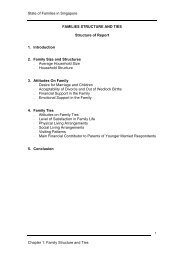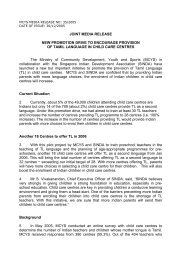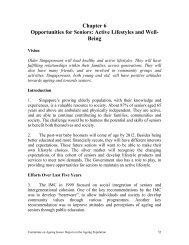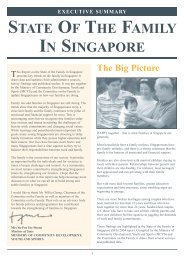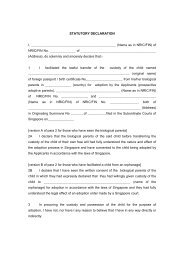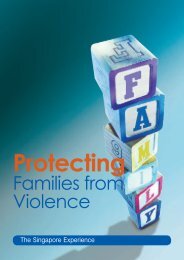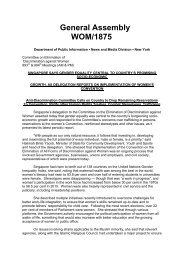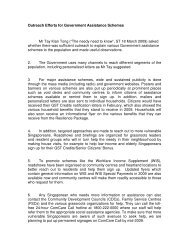A Single Parent Guide - Ministry of Social and Family Development
A Single Parent Guide - Ministry of Social and Family Development
A Single Parent Guide - Ministry of Social and Family Development
You also want an ePaper? Increase the reach of your titles
YUMPU automatically turns print PDFs into web optimized ePapers that Google loves.
HEART TALK – LOSS AND YOUR CHILD<br />
As a single parent, you will find yourself shouldering multiple<br />
tasks <strong>and</strong> roles – you provide for the family, care for <strong>and</strong><br />
discipline your children, <strong>and</strong> organise the home – on your<br />
own, while trying to meet your personal needs.<br />
How well you cope with your many roles may influence<br />
your relationship with your children. This, in turn,<br />
influences how well your children cope with the<br />
situation.<br />
page • 05<br />
How can I help my child to adjust to the change in our family situation?<br />
A crisis such as divorce or death may lead to feelings <strong>of</strong> loss <strong>and</strong> emotional distress.<br />
Some children may not know how to cope with such feelings <strong>and</strong> express them<br />
in the wrong way. It is important to let your children know that you care for<br />
them <strong>and</strong> they are not to be blamed for the divorce or death. Be open <strong>and</strong> let them<br />
know that they can talk to you about their thoughts <strong>and</strong> feelings. You may also<br />
wish to approach a counsellor to help you <strong>and</strong> your children get over the loss.<br />
(See Counselling services listed on pages 16-18.)<br />
I am angry that my children <strong>of</strong>ten compare me with my ex-spouse who showers<br />
them with gifts <strong>and</strong> outings in the weekends.<br />
Though divorce signals the end <strong>of</strong> a marital relationship between two adults, it<br />
does not mean the end <strong>of</strong> the relationship between the parents <strong>and</strong> children.<br />
It is quite common for parents who get short visitation rights to “enjoy” the limited<br />
time with the children because they miss out on a lot <strong>of</strong> the larger portion <strong>of</strong> their<br />
lives. They may also shower gifts to compensate for the lack <strong>of</strong> time they have.<br />
That said, as the main caregiver, you may end up having to deal with the children<br />
comparing the different treatments they get from you <strong>and</strong> your ex-spouse. Talk<br />
to them about the differences <strong>and</strong> show that you are glad <strong>and</strong> value their happiness<br />
with both parents so that they feel accepted <strong>and</strong> affirmed. Remember that each<br />
child has the right to love both parents <strong>and</strong> should not be made to feel guilty<br />
about ‘hurting’ one parent by ‘loving’ the other more or be forced to take sides.<br />
Ideally, both you <strong>and</strong> your ex-spouse should put aside your personal conflicts <strong>and</strong><br />
agree on how you want to raise your children. Try to talk these things over together.<br />
If you have trouble getting through to your ex-spouse, approach a counsellor for<br />
help. (See Counselling services listed on pages 16-18.)



